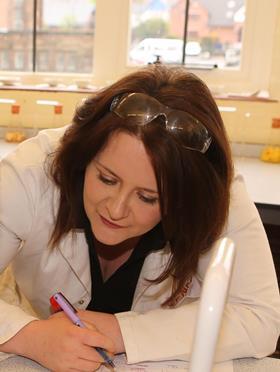Trainee, newly qualified and early career teachers ask the questions you daren’t, and our experts provide the answers. If you’ve got a question, tweet us

A student came to me asking why she understands so well in class, but just doesn’t get the questions in tests. So many kids’ test performance doesn’t match how they are in class. How can I help her and everyone else? Practice? Something else?
Q: A student came to me asking why she understands so well in class, but just doesn’t get the questions in tests. So many kids’ test performance doesn’t match how they are in class. How can I help her and everyone else? Practice? Something else?
@Illwriteitdown, RQT
A: Dorothy Warren, science education consultant
First of all I would reassure your student that she is not alone. Many students experience this and it is something we all need to work on. It takes time for students to really master and understand new knowledge. Answering a question in the secure environment of the classroom, having been through a similar example, is very different to attempting a question on your own under test conditions several weeks later. But you will get there in the end.
So how can you help your students? Firstly, good modelling of answers followed by plenty of practice is often a recipe for success. Students do need to know what a good answer looks like. Start by using straightforward questions to consolidate learning and then move on to more challenging questions, which may require students to apply their knowledge. Use scaffolding and/or writing frames to help students structure their answers.
Secondly, revisiting the topic after teaching another topic will help students with knowledge retrieval. For example, after teaching students how to balance equations, take opportunities to practise this skill when you meet a chemical reaction in a different topic.
Finally, be patient, it takes time. Many questions require students to use and apply knowledge from several different curriculum areas including maths and English. It’s often only at the end of the course when you are doing that final bit of revision when everything comes together. It’s important for you to encourage your students as they build up resilience. If they can do it in the lesson, they will eventually be able to do it in the assessment, as long as they are willing to put in the hard work and act on the feedback you give them.

Dorothy Warren, science education consultant, answers: First of all I would reassure your student that she is not alone. Many students experience this and it is something we all need to work on. It takes time for students to really master and understand new knowledge. Answering a question in the secure environment of the classroom, having been through a similar example, is very different to attempting a question on your own under test conditions several weeks later. But you will get there in the end.
So how can you help your students? Firstly, good modelling of answers followed by plenty of practice is often a recipe for success. Students need to know what a good answer looks like. Start by using straightforward questions to consolidate learning and then move on to more challenging questions, which may require students to apply their knowledge. Use scaffolding and/or writing frames to help students structure their answers.
Secondly, revisiting the topic after teaching another topic will help students with knowledge retrieval. For example, after teaching students how to balance equations, take opportunities to practise this skill when you meet a chemical reaction in a different topic.
Finally, be patient, it takes time. Many questions require students to use and apply knowledge from several different curriculum areas including maths and English. It’s often only at the end of the course when you are doing that final bit of revision when everything comes together. It’s important for you to encourage your students as they build up resilience. If they can do it in the lesson, they will eventually be able to do it in the assessment, as long as they are willing to put in the hard work and act on the feedback you give them.
Q: Any advice for reducing teacher talk? I’m stuck in my box and the kids are limited in how much they can move around but talking so much isn’t working. The kids are bored and I’m exhausted.
Any advice for reducing teacher talk? I’m stuck in my box and the kids are limited in how much they can move around but talking so much isn’t working. The kids are bored and I’m exhausted.
Holly P, NQT
A: Kristy Turner, school teacher fellow
Firstly, try not to worry too much about the teacher talk. The current circumstances are far from normal and the reduction in variety in the rest of their curriculum is likely to be adding to their ennui. However, I understand your frustration and desire to do something in the short term.
Think about what the students could do as you talk. This will depend on what you are teaching of course, but some ideas are mind mapping the explanation, annotating a diagram or filling in the gaps in a worksheet. If you are working from booklets or textbooks, then students could read sections in turn like they do in their English lessons. This is also a good way of enhancing cross-curricular literacy.
There are other forms of interactivity that can be used with students in their seats. Mini whiteboards are good for checking understanding and so is Plickers, a classroom-polling app where you scan students’ responses on cards that they hold up. To break the cycle you might need to plan these activities into your lesson materials, but once you have done it a few times it should become more spontaneous.

Kristy Turner, school teacher fellow, answers: Firstly, try not to worry too much about the teacher talk. The current circumstances are far from normal and the reduction in variety in the rest of their curriculum is likely to be adding to their ennui. However, I understand your frustration and desire to do something in the short term.
Think about what the students could do as you talk. This will depend on what you are teaching of course, but some ideas are mind mapping the explanation, annotating a diagram or filling in the gaps in a worksheet. If you are working from booklets or textbooks, then students could read sections in turn like they do in their English lessons. This is also a good way of enhancing cross-curricular literacy.
There are other forms of interactivity that can be used with students in their seats. Mini whiteboards are good for checking understanding and so is classroom-polling app Plickers. To break the cycle you might need to plan these activities into your lesson materials, but once you have done it a few times it should become more spontaneous.
Dorothy Warren answers: Good quality questioning can really cut down teacher talk. Think about how you want to introduce the main ideas in the first part of the lesson. You could use a teacher explanation or demonstration, a short video clip, a simulation or even a student research activity if you have access to the appropriate resources.
Then set the students off with a differentiated worksheet. Give them an answer sheet so they can mark their own answers. After a while, stop the class and ask how they are doing. Find out from the students which questions are causing problems. Go over key answers with students who are struggling while the rest of the class carry on with the sheet. Towards the end of the lesson, check their learning by asking students to explain what they have learned or having a quick quiz.
Q: Is it normal to feel this exhausted in your NQT year? Do you get used to it?
Is it normal to feel this exhausted in your NQT year? Do you get used to it?
Miss Harding, NQT
A: Harry Lord, head of chemistry
Even pre Covid-19, I don’t know anyone who found their NQT year ‘easy’! It is a very difficult year for a huge variety of reasons. On top of all that, you have had to deal with Covid-19 and all that that has brought with it. However, thanks to remote learning, you are finishing your NQT year with a skill set that most of us who trained before you didn’t have. More than anything, however, I think the resilience that you and other trainees have developed during this year will make the years to come even easier.
It does get easier. It gets easier every year. As your subject knowledge improves, you become much more confident and have more headspace to think about the details of what works and what doesn’t in your context. You forgive yourself more readily when something doesn’t go as well as you would like, as you understand that not every lesson, every day is going to be the best. Your behaviour management improves and the relationships with your students develop. While we are never the ‘finished article’, as you move from being an NQT to an RQT, it does become easier. Good luck.

Harry Lord, head of chemistry, answers: Even pre Covid-19, I don’t know anyone who found their NQT year ‘easy’! It is a very difficult year for a huge variety of reasons. On top of all that, you have had to deal with Covid-19 and all that that has brought with it. However, thanks to remote learning, you are finishing your NQT year with a skill set that most of us who trained before you didn’t have. More than anything, however, I think the resilience that you and other trainees have developed during this year will make the years to come even easier.
It does get easier. It gets easier every year. As your subject knowledge improves, you become much more confident and have more headspace to think about the details of what works and what doesn’t in your context. You forgive yourself more readily when something doesn’t go as well as you would like, as you understand that not every lesson, every day is going to be the best. Your behaviour management improves and the relationships with your students develop. While we are never the ‘finished article’, as you move from being an NQT to an RQT, it does become easier. Good luck.
Dorothy Warren answers: Yes, this is normal and I would be worried if you weren’t exhausted. Teaching is a really demanding job and you do need to build up the stamina. By the end of each half term it is normal to be really tired, but you shouldn’t be exhausted – otherwise there is danger of burnout. To avoid this, try thinking about time management and the law of diminishing returns. Set aside the time you have for planning and assessment and do the best you can in that time slot. Remember the advice you give your students and don’t burn the candle at both ends. If you get too tired, everything takes longer and often the result is not as good.
However, saying that, there will be times in the year where deadlines must be met – for example report writing or exam marking. When you know something like this is coming up, plan lessons that don’t require lots of work outside of lesson time (for example by using self- or peer-assessment rather than individual marking).









No comments yet